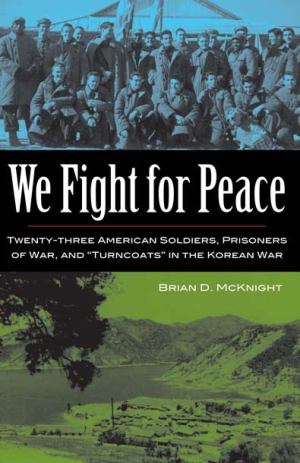We Fight for Peace
Twenty-Three American Soldiers, Prisoners of War, and "Turncoats" in the Korean War
Extensive detail provides insight into postwar treatment of Korean War POWs, putting it into present-day context.
As Brian D. McKnight acknowledges at the outset of his comprehensive history of twenty-three American soldiers who declined to return to the US at the end of the Korean War, most of what Americans know about that conflict stems from the 1962 movie The Manchurian Candidate. The melodramatic film about Korean War veterans brainwashed into assassinating a presidential candidate is in some respects less odd than McKnight’s tale about this group of American POWs who refused repatriation to the US after the armistice was declared in 1954.
The author, an associate professor of history at the University of Virginia’s College at Wise, describes how Edward Dickenson and Claude Batchelor (two soldiers from the group preferring to remain with their Chinese Communist captors) later escaped from captivity and returned to American lines. McKnight writes that “the remaining 21 became expatriates, and the United States, which had fought so hard for the return of these men, began exacting revenge on the two who had returned.”
Dickenson and Batchelor returned to an atmosphere of growing anticommunist hysteria in the US. As tensions mounted with Senator Joseph McCarthy’s hunt for communist spies in the US Army, both men were eventually convicted and imprisoned for “collaboration-related crimes.” Making matters worse, the remaining twenty-one expatriates ultimately came home but were not prosecuted, shielded by dishonorable discharges they received upon return.
Why were Dickenson and Batchelor singled out for retribution while the others escaped prison time and censure? In exhaustive detail, McKnight sets the background for the treatment of these prisoners of war—both in Chinese prison camps and back in the US—drawing extensively on firsthand accounts and other primary sources.
We Fight for Peace: Twenty-Three American Soldiers, Prisoners of War, and “Turncoats“ in the Korean War“ is an absorbing and thoroughly researched account of the dire experiences of American soldiers, both during and after the Korean War. This scholarly examination of wartime imprisonment and the postwar treatment of POWs will appeal most to Korean War history buffs and others drawn to accounts of survival and redemption.
Reviewed by
Lee Polevoi
Disclosure: This article is not an endorsement, but a review. The publisher of this book provided free copies of the book to have their book reviewed by a professional reviewer. No fee was paid by the publisher for this review. Foreword Reviews only recommends books that we love. Foreword Magazine, Inc. is disclosing this in accordance with the Federal Trade Commission’s 16 CFR, Part 255.

